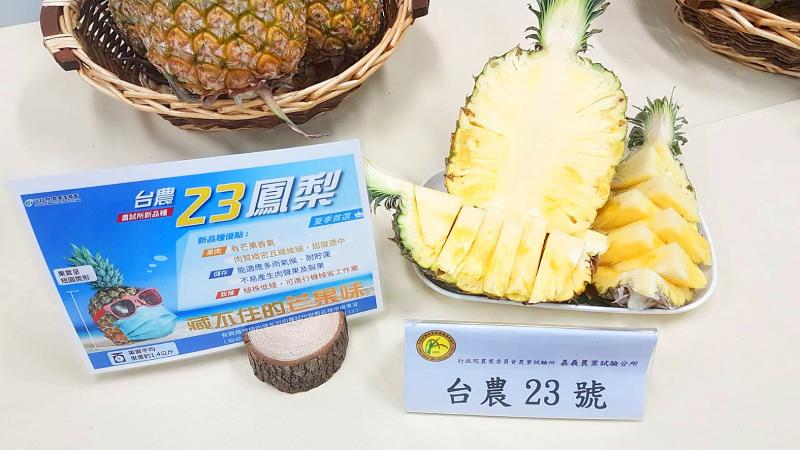The Taiwan Agricultural Research Institute has launched a new pineapple cultivar that smells like a mango and is better adapted to rainy weather, saying it could be a new star of exported fruits.
The new cultivar, named Tainung No. 23, was developed by the institute’s Chiayi Agricultural Experiment Station after 24 years of research.
Bred from two parent pineapple cultivars — Tainung No. 19 and Tainung No. 21 — the new cultivar is better adapted to Taiwan’s rainy environment, station associate researcher Kuan Ching-shan (官青杉) told a news conference in Chiayi City on Friday.

Photo: Ting Wei-chieh, Taipei Times
Due to the nation’s hot and wet summers, many pineapple strains yield poor-quality fruit, which might contain too much moisture, have a weaker flavor or ripen too quickly, the station said, adding that this results in losses for farmers.
The effects of climate change have made the situation worse, it added.
By comparison, the Tainung No. 23 pineapple features a mango smell that would not be affected by the summer weather, with its sweetness and sourness nicely balanced, Kuan said.
Dubbed “mango pineapple” by farmers, the new cultivar’s average sweetness reaches 18.2 degrees, with a sourness of about 0.7 degrees, he said, adding that it tastes delicate and does not have apparent fibers.
According to the Agriculture and Food Agency’s fruit sweetness scale released in 2018, sugar cane for ordinary consumption (not for making sugar) usually has 20 degrees of sweetness, while a quality pineapple should have at least 13 degrees.
Weighing 1.4kg each on average, the new pineapple looks like a short cylinder, and its skin takes on an orange hue when it ripens, Kuan said.
Its plants are relatively short, to help farmers, the station said, adding that farmers should use machines to save on labor when caring for the plants.
Its fruit produced in autumn and winter can be stored longer, making it suitable for exporting, the station said.
The Japanese market has responded positively to the pineapple, station director Chen Kan-shu (陳甘澍) said, adding that farmers interested in growing it can contact the station for authorization.

Taiwan is stepping up plans to create self-sufficient supply chains for combat drones and increase foreign orders from the US to counter China’s numerical superiority, a defense official said on Saturday. Commenting on condition of anonymity, the official said the nation’s armed forces are in agreement with US Admiral Samuel Paparo’s assessment that Taiwan’s military must be prepared to turn the nation’s waters into a “hellscape” for the Chinese People’s Liberation Army (PLA). Paparo, the commander of the US Indo-Pacific Command, reiterated the concept during a Congressional hearing in Washington on Wednesday. He first coined the term in a security conference last

Prosecutors today declined to say who was questioned regarding alleged forgery on petitions to recall Democratic Progressive Party (DPP) legislators, after Chinese-language media earlier reported that members of the Chinese Nationalist Party (KMT) Youth League were brought in for questioning. The Ministry of Justice Investigation Bureau confirmed that two people had been questioned, but did not disclose any further information about the ongoing investigation. KMT Youth League members Lee Hsiao-liang (李孝亮) and Liu Szu-yin (劉思吟) — who are leading the effort to recall DPP caucus chief executive Rosalia Wu (吳思瑤) and Legislator Wu Pei-yi (吳沛憶) — both posted on Facebook saying: “I

Sung Chien-liang (宋建樑), who led efforts to recall Democratic Progressive Party (DPP) Legislator Lee Kun-cheng (李坤城), was released on bail of NT$80,000 today amid outcry over his decision to wear a Nazi armband to questioning the night before. Sung arrived at the New Taipei District Prosecutors’ Office for questioning in a recall petition forgery case last night wearing a red armband bearing a swastika, carrying a copy of Adolf Hitler’s Mein Kampf and giving a Nazi salute. Sung left the building at 1:15am without the armband and covering the book with his coat. Lee said today that this is a serious

A mountain blaze that broke out yesterday morning in Yangmingshan National Park was put out after five hours, following multi agency efforts involving dozens of fire trucks and helicopter water drops. The fire might have been sparked by an air quality sensor operated by the National Center for High-Performance Computing, one of the national-level laboratories under the National Applied Research Laboratories, Yangmingshan National Park Headquarters said. The Taipei City Fire Department said the fire, which broke out at about 11am yesterday near the mountainous Xiaoyoukeng (小油坑) Recreation Area was extinguished at 4:32pm. It had initially dispatched 72 personnel in four command vehicles, 16